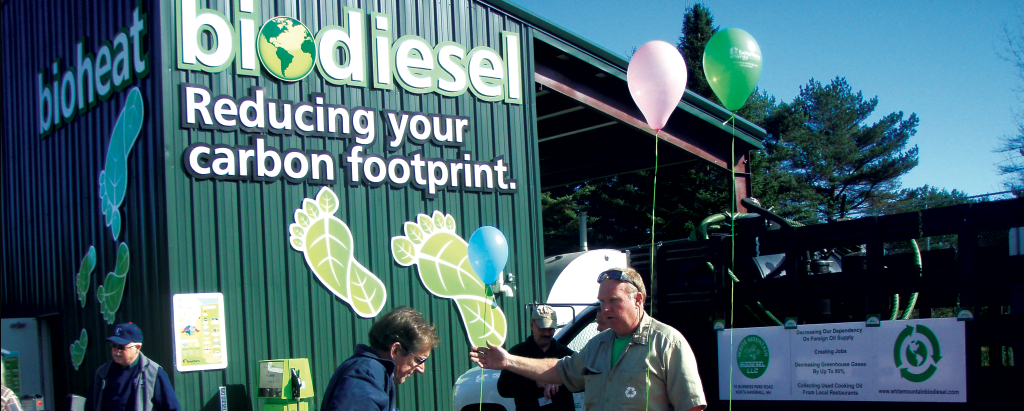All
Leveraging the RFS for Success in Home Heating
by Jenna Higgins Rose, for the National Biodiesel Board

Robert Kuhsel says he didn’t want to end up an old man on a barstool crying into his beer over what might have been. At one time a high school shop teacher, he decided it was time for a dramatic career change. “What motivated me was that I was not happy with foreign oil and tired of supporting it,” Kuhsel said. “I said ‘I’m going to do something about it.’ This is what I did.”
What he did was take a leap of faith into the biodiesel business. Having gained exposure to alternative energy as a school administrator for Amity Regional in Woodbridge, Conn., he started looking into biofuels and decided biodiesel made sense. In 2008, during a dark chapter of biodiesel history when many others were leaving the business, he and his partner saw opportunity. They broke ground on White Mountain Biodiesel, LLC, in North Haverhill, New Hampshire.
The company has produced biodiesel for about three years, focusing on selling into the fuels and Bioheat® heating oil market in New Hampshire, Massachusetts and Vermont. To ensure a quality product, each batch is tested in-house, and an independent laboratory does random sampling.
While the business is successful today, employing about 20 workers, the road has had a few rough spots.
The RFS Road
One of those rough spots came with the implementation of the federal Renewable Fuel Standard (RFS), which sets modest minimum requirements for the blending of renewable fuels in the American fuel supply. With the capacity to produce 3 million to 4 million gallons per year, the plant is classified as a small producer. That made selling RINs, the credits used to fulfill RFS obligations, a challenge. “We felt a bit like prey as a small producer,” Kuhsel laments. “When we went to sell our RINs, obligated parties weighed their risk/reward in working with us, and ultimately we had to sell at a discount because of our size.” Those trying times in the early stages of the RFS have turned around, thanks in part to a RIN Integrity Task Force set up by the National Biodiesel Board to look for viable solutions to build confidence in RINs for all involved. Now there are several options for producers of all sizes to validate their RINs, thus enabling them to earn full market value.
White Mountain opted to use third-party vendor Genscape to validate the plant’s RINs through the new EPA-approved Quality Assurance Plan program. The QAP is a voluntary program with the objective of providing a more structured means to make sure RINs entering the marketplace are generated in a manner that insures their validity for obligated parties. White Mountain sells its B99 biodiesel to local petroleum dealers who then delegate them back to the company, which they then sell to one or more obligated parties. “I would say enthusiastically that the system is working for us,” Kuhsel said. “There are other systems as well, but this was the best one for us.”
The Bourne Identity
One of White Mountain’s customers is Bourne’s Energy, a 66-year-old distribution business that began offering biodiesel and Bioheat® heating oil about three years ago. Based in Morrisville, Vermont, the company has locations and customers throughout Northern Vermont. Peter Bourne, president, says the company’s identity has changed with the addition of biodiesel. He uses the Bioheat® logo on his trucks, signs and marketing materials for his oilheat customers. About 85 percent of the company’s biodiesel business is for the home heating oil market, and the rest is for the on-road market. “New England has a tendency to prefer sustainable, green products, and our customer base fits into this,” Bourne said. “We wanted to differentiate ourselves from our competitors.” Bourne says his customers like the fact that he offers a clean and renewable energy source, and there have been no complaints regarding the low blends of biodiesel used in their applications.
Quality Assurance
Before he delivers to the customer, Bourne takes steps to create a seamless experience for all. A certificate of analysis is presented from White Mountain Biodiesel that ensures all parameters of the current ASTM D6751 biodiesel specification are met. He puts the B99 into a separate 12,000-gallon tank. It is then injection-blended into the individual batches for customers, which ensures complete mixing of the B99 and the diesel fuel. He points out cost is a factor with any fuel, and the RFS has been effective at making biodiesel more competitive. “We’ll pay a premium for a renewable product, but the everyday consumer has a certain price point where they won’t pay more,” he said. “The economics have kept Bioheat® heating oil competitive, and I like to think our customers look at us in a more favorable light for doing it.”
Made from an increasingly diverse mix of resources such as recycled cooking oil, soybean oil and animal fats, biodiesel is the first and only EPA-designated Advanced Biofuel with commercial-scale production nationwide. Last year the industry broke 1 billion gallons of annual volume. “Biodiesel is living proof that Advanced Biofuels are available today and that they can reduce prices for consumers,” said Paul Nazzaro, petroleum liaison for the National Biodiesel Board. “The RFS is working as intended to diversify our fuel supply and stimulate new technologies and jobs.” Biodiesel is produced in nearly every state in the country and supports some 50,000 jobs.
For Kuhsel, the biodiesel road is not one he regrets taking. He says the business is thriving, although there is always room for growth. “I’d love to create more jobs and decrease more greenhouse gases,” he said. “I have no regrets. I’d do it all again.”
Related Posts
 The Possibilities of Renewable Propane
The Possibilities of Renewable Propane
Posted on March 13, 2024
 Propane Can Do That
Propane Can Do That
Posted on March 12, 2024
 Take Action and Take Control of Your Future at Industry Summit VI and Visions ‘24
Take Action and Take Control of Your Future at Industry Summit VI and Visions ‘24
Posted on March 11, 2024
Enter your email to receive important news and article updates.

